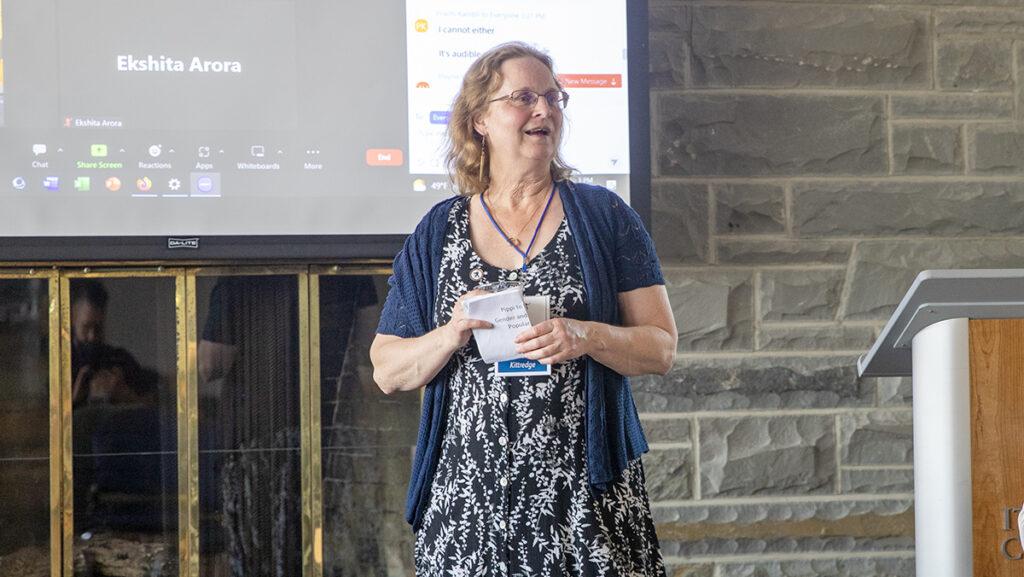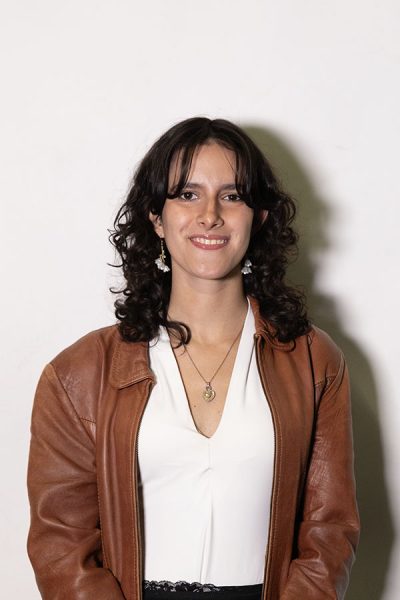Students, alumni, scholars, librarians and teachers have all come together to “geek and nerd out” in an academic conference that features gender and sexuality in popular culture and mainstream media from all spaces and times — whether it be in YA literature, 2000s teen comedies or digital dolls.
On the weekend of April 21–22, members of the Ithaca College community eagerly participated in the sixth edition of the Pippi to Ripley Conference. This unique event celebrated the power of strong female characters and diverse representation alike in literature, film and popular culture, exploring their impact on society and inspiring attendees to break down gender barriers in their own lives.
Katharine Kittredge, professor in the Department of Literatures in English, said she created Pippi to Ripley in 2011 with some friends as a means to bring the best of academic conferences and fan conventions, so that it might act as a moment of gathering and a forum for academics, creators and fans. The event is free for the public and presenters’ guests with only a $50 fee for presenters in order to cover food expenses as well as other miscellaneous costs, like poster printing.
Colleges across the country have hosted similar academic conventions: Catwoman to Katniss at Middle Tennessee State University in 2012 and Buffy to Batgirl at Rutgers University in 2014. Because of the COVID-19 pandemic, the Pippi to Ripley conference had not been hosted since 2019. However, the conference has now employed Zoom for the first time, making it possible for presenters from nine different countries — Uganda, Greece, the United Kingdom, India, Ireland, Mumbai, Sweden and Canada — to participate allowing the panels and discussions to reach an international platform.
As an undergraduate, there are two ways to be a part of the Pippi to Ripley conference: submit a proposal of a potential topic to Kitteredge or join her senior seminar, which focuses on learning the “how-tos” behind planning an academic conference and making a presentation for one. During the spring semester, 10 students meet once a week for two and a half hours where they spent the first part planning conference-related activities and the second half workshopping their own presentations for the conference with their classmates.
Senior Samantha Frieri said the class had been empowering when it came to the responsibility and authority students had when organizing the conferences. She said it also helped students in realizing that they are capable of putting an event like this together whether it was emailing the presenters or categorizing the abstracts of chosen presentations into lumps that could share an hour-long session based on similarity of the topic being touched.
“It’s one of the only conferences I feel like undergraduate students are, one, involved in planning and, two, encouraged to participate in,” Frieri said. “I feel like this is a very scary thing because it feels so adult, and so it can be easy to think that you’re not like prepared for something like this, but that’s the whole point of this, that this is built on the backs of undergraduates that are really just passionate about what we do.”
Eliana Berger ’20 and Andy Yzaguirre ’20, who are pursuing their graduate degrees at Simmons University in Boston, were invited back as presenters for this year’s Pippi to Ripley conference, both as a part of the graduate panel and with presentations on subjects like “Queer Craft: Fandom & Queer Community in the Makerspace” and “Viola’s Soliloquy: An Examination of Twelfth Night Adaptations as Transgender Representation.”
“I think for people who are interested in research, for students, for professionals, unless you have experience, it’s really scary and difficult to enter that circle,” Yzaguirre said. “So having been able to do that in undergrad and being shown how to apply it, how to create the presentation and abstract and how to format it, really changed the game.”
Kittredge said the initiative behind this conference is to make it an inclusive and accessible experience for all. She said this would be achieved by helping scholars to not only build their CV but also create a space in academia where we celebrate the representation of broad spectrums of gender and sexuality in different media and contexts.
“I think a big part of it is … the economic realities of wanting to become a professor or wanting to go to grad school, is that a lot of even the conferences for undergraduates charged hundreds of dollars for admission,” Kittredge said. “And it’s one of those barriers because if you don’t do conference work, it’s harder to get into grad school or once you’re looking for a professor’s job. You can’t get that unless you’ve shown you know these professional activities.”
After a whole semester of work, students finally get to share their research with audiences, alongside other scholars, in a series of 10 sessions on topics that range from Current Bans on LGBTQ+ Comics, to Non-Conforming Women in Many Media, to Defying & Defining Gender in Children’s Lit. and more. The weekend also contained a panel of current graduate students at colleges across the country in programs in English, communications and library sciences to have an open discussion of what graduate school can be like. The 2023 Keynote Speaker was Michelle Ann Abate, professor in the Department of Teaching and Learning at Ohio State University, with her “Funny Girls: The Forgotten History of Feisty Young Female Characters in Classic American Comics” presentation.
“It’s really exciting to get to be in a space where we can just geek out about these things and be nerds too,” Frieri said. “We’re reminding ourselves that even though these things are just like pop culture and media, we are really knowledgeable about it and they do have a place in academia.”
Not only is this an opportunity for students in the course to make their own presentations, but there is a call for papers for anyone who is interested in curating their own presentation for Pippi to Ripley, usually in the fall semester previous to the event. The open discussion following the presentations allows for a constructive and knowledgeable dialogue between peers.
“I had no idea that that was able to be used again in a professional context beyond college without being a professor,” Yzaguirre said. “And this allowed us to come in contact with a lot of people who were doing this professionally or as, like, a small facet of their professional life.”
Berger also expressed concern about the college’s departments and administration missing out on an opportunity by not raising more awareness about the conferences like Pippi to Ripley and not making the most out of all it offers to students, alumni and community members. Junior Tommy Zieger, another student in Kittredge’s class, was excited when he found out about the class — attributing its appeal initially to Kittredge and in the process connecting through his passion for several of the conferences’ topics such as educational theory.
“There’s a lot of interest in storytelling on campus outside of the English department,” Zieger said. “We tell stories in the Park School and with our music in Whalen and in Dillingham. There are all these different areas of study outside of just literature that take an interest in storytelling and the way that we communicate our identities to each other. I think marketing that to some of the other schools might be a way for people to understand that this is something for everybody.”
Another of Kittredge’s students, senior Kathryn Ksiazek, talked about the potential of sharing the space with Ithacon, hoping this would inspire more people to engage with the event.
“These kinds of conferences normalized talking about clearness, transness, feminism, and I think it makes it a lot more accessible to a lot of people because it’s fun,” Ksiazek said. “These sort of conferences are a great way to get students to engage with their college and with like-minded people on the campus.”















